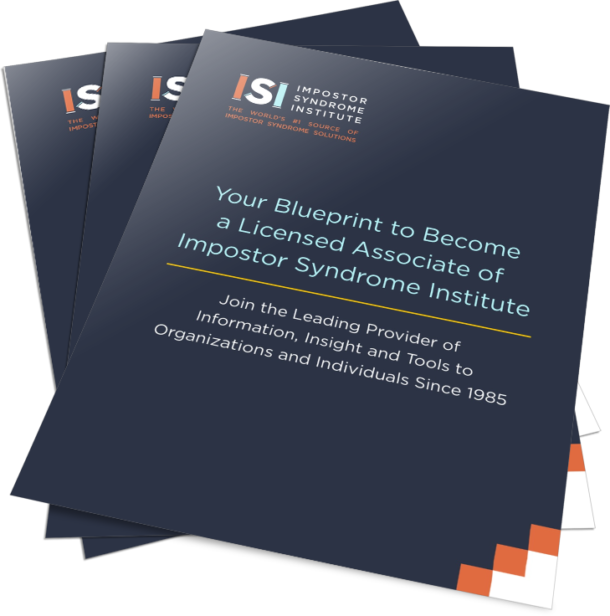Visitors to ImpostorSyndrome.com have the opportunity to sign up for free weekly Confidence Builders.
I created these to remind people that if you want to stop feeling like an impostor, you have to stop thinking like an impostor.
One recent Confidence Builder was pulled from a chapter in The Secret Thoughts of Successful Women called, “Is it ‘Fear of Success’ or Something Else?”
It read: “If the work you were doing and the environment in which you were doing it reflected your gifts and priorities, would you still question your competence to the same degree?”
That prompted K to write with a question:
“I would like to better understand what this quotation is trying to help me see… I want to say “yes,” which indicates I have Impostor Syndrome. But what is it helping me to see, to get beyond the syndrome?”
K’s question made me realize that the take away requires some context. So let me pull a page out of my book and explain…
Success Female Style
It’s impossible to talk about women’s greater susceptibility to the impostor syndrome or for that matter about women’s supposed fear of success without looking at how women tend to view success.
The fact is no one talked about women being afraid of success until the 1980s when they began entering the traditionally male work world in large numbers. Once they did it was naturally assumed women would aspire to achieve the traditional measurements of success – status, money, and power. Plenty of women have.
But not everyone got on board or at least not to the exclusion of other priorities.
Whether you embrace the money/power/status model or not, it is no coincidence that situations where these elements are in play – salary negotiations or being singled out for recognition in your field or being tapped for a promotion – are also the very times when you wonder, “Do I really deserve it?” or “Can I really handle it?” You assume it’s the self-doubt talking. And maybe it is.
However, it’s also true that women have always had a more layered definition of success which means it’s just as likely that your anxiety could be signaling a mismatch between the social definition of success and what matters most to you.
It’s not that status, money, and power aren’t important.

For you, they may be paramount.
Overall though, women place – and it should be said, have been allowed to place – a higher value on the quality of their personal and work lives.
It’s one of the reasons, for example, that women-owned businesses tend to be smaller than businesses owned by men.
Instead of being motivated by the opportunity to be the “boss” and to grow the enterprise as big as possible as men are, more women report starting a business to be personally challenged and to integrate work and family.
To be clear, having different priorities is not the same as shooting low.
Even high achieving women often share a more expansive view of what success looks like.
When asked to define success, female medical school students, residents, and faculty alike described the need for “career efficiencies that allow individuals to excel professionally while also honoring their personal values and responsibilities.”
In plain English: They want a successful career and they want a life.
There are, of course, more than a few men who would love to forgo obligatory golf outings or to log fewer hours on the job in order to spend time with their family.

Unfortunately, society has confined men to a view of success measured exclusively in work and material terms.
We know, for instance, that male business owners are more than twice as likely as women to cite family or financial pressures to keep a steady, traditional job and be the breadwinner as the main challenge to being able to make it as an entrepreneur.
And a study exploring male-female attitudes about success found many men who had pursued it to the detriment of their family later looked back at their lives with a sense of regret.
A Different Kind of Fraud
The heart of K’s question is this…
For a lot of people — and women especially — success also has a lot to do with the nature of the work itself.
We know that income plays a smaller role in female self-esteem.
So when given the choice between making a lot of money and doing work that is personally enjoyable or meaningful, a woman is more likely than a man to choose the latter.
It’s the reason why efforts designed to attract more women into the fields of science, technology, and engineering must go to great lengths to emphasize the social value of the work to female candidates.
Ideals are so important to women that in an experiment where students who were enrolled in an introductory college physics class were asked to reflect, even briefly, on their most closely held values the women showed a significant improvement in their academic performance.
The exercise had no effect on the male students.
If the work you do does not reflect your authentic self you can become a different kind of fraud.
You were cast as an attorney or a pharmacist when deep down you long to dig in the soil, help find a cure for autism, or be the next Jane Goodall.
But rather than heed your calling, you go to job interviews and tell them you love doing this or that, knowing full well that you’re lying through your teeth.
One day you wake up and wonder, “How did I get here?”
It’s a different kind of fakery for sure.
Still, it can make it tougher to distinguish whether what you’re feeling is intellectual fraudulence or vocational in-authenticity.
It’s not only women who get tripped up here. Just yesterday I received an email from a fellow named “Frank” with the subject line, “What if I really *am* an impostor?”
After recently completing his Ph.D. in physics Frank was admitted into a post-doctoral program.

By all outside measures, Frank is a success.
He should feel great about what he’s achieved. Instead, the guy is so miserable he’s seriously considering giving up his fledgling career:
“I can’t shake this feeling that I really am a fake. I’m not really good in the field I’m supposed to be an expert in, and that’s not talking bad about myself, that’s an actual objective assessment. I know what I am capable of, and I know what I should be capable of, and there is a huge difference.”
Make no mistake about it, Frank is faking it.
But perhaps not in the way he thinks.
True he did offer clues of being hampered by the false belief that his being considered competent requires he come up with “original ideas.” (Thinking, you may recall, which is indicative of the Natural Genius Competence Type).
At the same time, I couldn’t help but notice there was nothing in Frank’s letter that remotely suggested a passion for physics. In fact, his ended by saying:
“I’m really depressed, and I have no idea what it takes to make me feel good again. I’ve given up basically all my hobbies ‘thanks’ to science, and now I’m stuck in a rut, where I get the impression I’m not wanted/needed/useful.”
Obviously, if Frank’s hobbies and the need to know that his work matters weren’t important to him, he wouldn’t have bothered bringing them up.
The fact that he did, suggests that Frank’s main problem is not that he lacks the intelligence to succeed in his field. The problem is that he’s either in the wrong field altogether or he’s in the right field but he’s applying his training in the wrong arena.
It’s something I see more often than you might think, especially among well-educated people.
You invest six, eight, twelve years of your life and in some cases, well over a hundred thousand dollars in training to become a lawyer or a surgeon or a professor or a physicist only to wind up feeling conflicted and anxious.

You think you’re just worried that you still don’t have the intellectual goods to succeed in your field when in fact it may be that in your heart of hearts, you know you’re on the wrong path. Given everything you’ve invested you feel tremendous pressure to not “waste the degree.”
If that rings true for you, first know that nothing is wasted.
You can’t always fully see it now, but every experience you’ve ever had in some way contributes to your own unfolding story.
Look at me. It was only after investing a lot of blood, sweat, and tears (lots of tears) to earn my doctorate that I realized I didn’t “need” the degree to perform the work I do.
But I don’t regret the experience for a moment.
That experience is what inspired me to become an adult educator which led me to be a professional speaker and workshop leader. This gave me the credentials to snag a position in the training and development department of a Fortune 200 company which, once on the inside, allowed me to make a lateral move into management in a marketing function where I gained the knowledge and skills that enabled me to go on and launch my own business. Which, 16 years later, brought me full circle to bring to this book first-hand knowledge of my three main audiences – students, people in the corporate world, and entrepreneurs.
The American author and journalist Christopher Morley once said, “There is only one success, to be able to live your life in your own way.”
How you define success matters, and even more so if you feel like an impostor.
The question you need to ask is, “If the work I was doing, and the environment in which I’m doing it reflected my gifts and priorities, would I still question my competence to the same degree?” If the answer is no, then a career shift may be in order.
You don’t have to walk away tomorrow.
But at least when the anxiety sets in you’ll know what you’re dealing with.
If you do decide to change course, start by giving yourself permission to move in whatever direction your natural gifts and interests take you.
What does success mean to you? I’d love to hear your thoughts…
You are welcome to reprint this post with the bio below.



